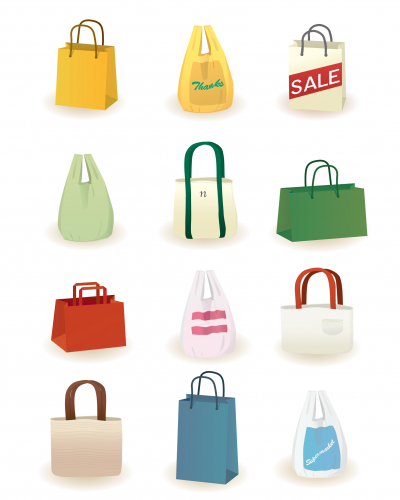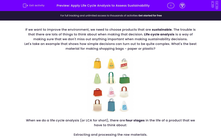If we want to improve the environment, we need to choose products that are sustainable. The trouble is that there are lots of things to think about when making that decision. Life cycle analysis is a way of making sure that we don't miss out anything important when making sustainability decisions.
Let's take an example that shows how simple decisions can turn out to be quite complex. What's the best material for making shopping bags - paper or plastic?

When we do a life cycle analysis (or LCA for short), there are four stages in the life of a product that we have to think about:
Extracting and processing the raw materials.
Manufacturing the product and its packaging.
Using the product during its lifetime.
Disposing of the product at the end of its life.
At each stage in the LCA, we need to think what resources (especially energy) are used, and whether they are renewable or non-renewable. We also need to think about what waste products are produced, and the effects of disposing of them. To see how this works, let's think about the LCA for paper and plastic bags.
Raw materials:
Paper bags are made from wood. Wood is renewable, but large quantities of water and energy are needed to turn wood into paper.
Plastic bags are made from processing crude oil. Oil is a non-renewable resource.
Manufacturing the product:
Turning paper into bags uses quite a lot of resources because of the need to glue the bag together.
Turning plastic sheet into bags is relatively easy, since the joins can be made by melting small amounts of the plastic.
Use:
Paper bags can normally only be used a few times before they become damaged.
Plastic bags are stronger than paper, so can be used many times.
Disposal:
Paper biodegrades easily, and can normally be recycled.
Plastic can sometimes be recycled. If plastic is not recycled, it does not biodegrade.
Conclusion:
Which material is better depends on how people will use the bags. If they re-use shopping bags, and recycle the plastic at the end, plastic shopping bags are more sustainable than paper bags. If they forget to do either of these things, then paper bags are more sustainable than plastic bags.
LCA doesn't automatically tell us which product is 'better', though it does highlight which factors make a difference.
Reuse or recycle?
At the end of a product's life, we can either reuse the product, or recycle the materials in the product.
'Bags for life' are an example of a product being reused, as are refillable water bottles.
Recycling is when we break an object back into its materials, and then make a new product out of them.
Recycling is usually more sustainable than making new materials from scratch. To make new iron, for example, we need to quarry iron ore from the ground, then heat it to extract the iron. This requires a lot more energy than melting down an existing iron product. However, recycling requires a lot of work to transport and sort products so that they can be processed into fresh materials.
The problem with a lot of environmental issues is that we need to think about numerous factors. Life cycle analysis gives us a tool for doing this.
Now it's time to have a go at some questions.








